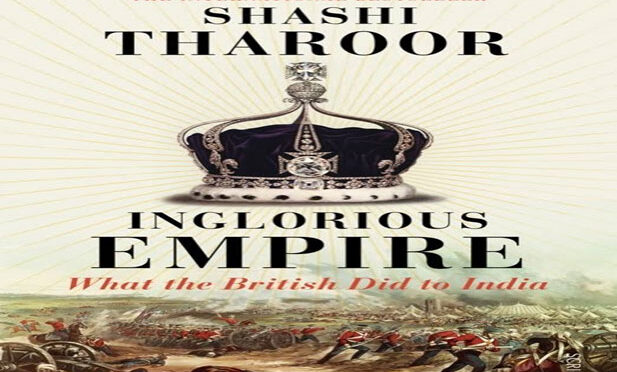Book Review: Inglorious Empire: What the British did to India
Posted on : July 18, 2022Author : Oishe Ghosh

Inglorious Empire by Dr. Shashi Tharoor reveals to the readers the gory and exploitative nature of British rule over India for nearly a century.
Title: Inglorious Empire: What the British Did to India.
Author: Shashi Tharoor
Published by: Aleph Book Company (India)Hurst Publishers; 2017 (UK)
Publication Date: March 2017
Length: 288 pages; Price: Rs. 2,500
Was the British dominion of India a genuine attempt toward the civilization of the masses? Or was it a subtle act of plunder? An eminent personality, a prolific politician and writer, and one who possesses the power to inspire the aspiring masses, Dr Shashi Tharoor passionately debates the substantial motive of India’s colonialization in his book ‘Inglorious Empire: What the British did to India’. Through this book, Dr Shashi Tharoor postulates his ideology on the British rule in India and deduces why ‘Britain owes reparations to her former colonies’. This book has been driven from Dr Shashi Tharoor’s speech at the 2015 Oxford Union.
According to Tharoor, the pre-eminent laws, rules and regulations promulgated by the British during its 200 years of dominion over India were an effort to earn long-term benefits while depriving the nation of its own wealth. India was the world’s most renowned exporter of fine textiles and gourmet spices. The British who set foot on this land as traders initially, soon transcended into a ruling power. How? The curse of ‘divide and rule’ created by the British, the political schism of the Indian rulers over territories, the loss of strong central authority and the death of Aurangzeb and his influence which depleted with his death.
The British policy of divide and rule has proven so lethally effective that it is still prevalent in contemporary social and political scenarios and remotely is a part of our everyday life. The Rajas during this period were in an incursive conflict with each other for gaining power and territories and the foreign strategists grasped this situation as a potent break-in to inflict the curse. A curse so powerful, that it withstood the ravages of time to segregate us concerning the matters of politics externally and caste, religion and language internally.
Tharoor mentions how the British exploitation had led a former flourishing economy renowned for producing luxury textiles, spices, ships and natural resources to a mere colony that could only grow as much with all the limitations it faced and profusely turned into a raw material producing region. Taking the examples of Indian weavers, Tharoor explains how these weavers who were once renowned for their amicable talent, had been exploited and turned into paupers when strikingly high taxations were put upon their work and the raw materials, with which they had to work to earn their living. Most of the raw materials in addition to being taxed highly were also exported to the manufacturing mills of Britain that became the grand products flooding the world markets. This turned Britain into a threshold of expanding power while a thriving export-based economy came tumbling down and was turned into an import-based colony.
Tharoor actively disposes of the theory of an ‘enlightened despotism’ which mentions that the ignorant and the uneducated did gain from the act of colonialization and civilization of the primitive masses. If we look into the idea of enlightened despotism we will realize that this concept in itself is woven for and to upraise the colonizers. He turns the attention towards Winston Churchill, pointing out that during the British-induced Bengal famine in the interim of the second world war, Churchill concluded that the starvation of the civilians of Bengal was owing to the fact that they could not control their population count and were already on the brink of death due to illness and weakness. The bona fide hypothesis for such a disastrous consequence was because of starvation due to high taxation and revenue collection and Churchill’s stockpiling of food sources for the armies that were fighting in the frontline which led to food shortages for the people living in Bengal, but this fact should have remained imperceptible and unannounced. This situation when compared to the Greeks who had hoarded supplies from the civilians to feed the Europeans, remains insignificant. Roughly 21 million people died of starvation from 1891 to 1944.
We can consider some pragmatic outcomes of ‘enlightened despotism’. The position of women was greatly uplifted, who were previously neglected immensely. Reformers like Raja Ram Mohan Roy took inspiration from the west to assist women who were exploited in the then society which was affected vehemently by Brahmanical patriarchal norms. The period also saw the rise and fall of an entire community, the Brahmo Samaj which came into existence in an act of segregation from Hinduism which was during that period heavily affected by exploitative and discriminative norms and regulations of Manusmriti. Education was also herded into the masses and educational institutions were established. This period saw the initiation of a strive to educate women which resulted in the ascent of the first generation of Indian women doctors and lawyers.
Despite some of these beneficial developments, most of the implications of this new approach had sceptically exploited the economy and society. Moreover, despite the institutionalization of academic establishments, the colonial exploiters severely neglected the education of the colonized and as a result, India’s literacy rate during the time when India gained its independence in 1947, had hit rock bottom.
In addition to these factors, Tharoor added that the British induced communal disunity, wars and racism fuelled in weakening of the nation. Shashi Tharoor being an extraordinary writer and analyst has significantly explained the evils of Britain’s imperialism over India.
Oishe Ghosh
Intern, Asia in Global Affairs
Sources:
Shashi Tharoor, Inglorious Empire: What the British did to India, London 2017
The Irish Times – Inglorious Empire: What the British did to India
The views, thoughts, and opinions expressed in the text belong solely to the author, in her personal capacity. It does not reflect the policies and perspectives of Asia in Global Affairs. The author remains responsible for the originality of content.





Leave a Reply